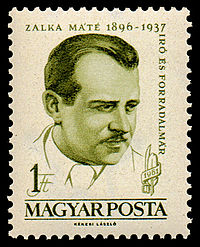- Máté Zalka
-
Máté Zalka (April 23, 1896, Tunyogmatolcs, Hungary - June 11, 1937, Huesca, Spain) was a Hungarian writer and revolutionary. His real name was Béla Frankl. He attended Polgári Iskola (high school) in Mátészalka, which was later renamed in his honor. (The name was later rechanged after the fall of the Communist regime). When he was 18, Zalka lied about his age in order to volunteer in the Hungarian Army.
Officer of hussars Zalka fought in Italy which later became the subject of his novel "Doberdó". He went to battle on the Russian front in 1917 and ended up in a Russian prisoner of war camp, where he was influenced by Communism.
In February 1918, during the Russian Civil War, Zalka formed an international group of Red Guards in Khabarovsk which mainly comprised ex-prisoner Hungarians, and participated in the punitive operations in Siberia against the White formations; with posse heated from Zalka extraordinary brutality. His squadron atrocities does not confront them inferior that of Ataman Semionov).[1] At the end of World War I, Zalka chose to stay in Russia instead of returning to Hungary. Zalka met his Russian future wife Vera. They had one daughter, who later died due to complications from the accident at Chernobyl.
In 1920, Zalka fought against Poland in the Battle of Kiev. From 1921-23, he was commander of a regiment of cavalry of the VCK GPU, the Soviet Communist Party Secret Service, that fought in Crimea and Ukraine, and was involved in the elimination of teams NI Makhno and other Atamanov Ukraine. And the fact that this moviment enjoys widespread support of local people, many of the actions risulted in the punitive operations against civilians.[1] At some point, he fought in a war of liberation for Turkey under the assumed name of Lukács Tábornok (General Lukács), and for his efforts was honored with a statue of his likeness in Istanbul.
While he was in the prisoner of war camp, he organized the prisoners´ theatre. He was director of the famous "Theatre of Revolution" (now called "Mayakovsky Theatre") in Moscow (1925–1928).
In 1936, he moved to Spain, where in November 1936 he joined the International Brigades to fight in the Spanish Civil War. Under the assumed name of Pavol Lukács and with the rank of General, he commanded initially the XII International Brigade and then the 45th Division. In 1937, his car was hit by artillery fire and he was killed near Huesca. Zalka is mentioned in a number of works of Hemingway.[2]
His remains were originally buried in the south of Spain but decades after his death, Zalka's nephew (who also fought in the Spanish war) was invited by the Spanish royal family to a ceremony celebrating the end of the civil war. At this point, he was able to carry Zalka's remains to Hungary where they were buried in a military cemetery in Budapest along with other high-ranking Hungarian military heroes.
References
This article was initially written by his niece, daughter of his sister Paula Fankl. She remains in possession of several original documents written by her Uncle Bela and has recorded his history for personal reasons over the years.
- ^ a b Zaleski KA: "Stalin's Empire. Biographical encyclopaedic dictionary" Moscow. Veche. 2000
- ^ Hemingway Ernest: "Under the ridge". Hearst Magazines Inc. 1939
See also: FranklCategories:- 1896 births
- 1937 deaths
- 20th-century Hungarian people
- Hungarian soldiers
- Hungarian writers
- Jewish writers
- Jewish refugees
- Hungarian Jews
- Hungarian refugees
- Hungarian people of the Spanish Civil War
- Hungarian expatriates in Spain
- People from Mátészalka
- People from Szabolcs-Szatmár-Bereg County
Wikimedia Foundation. 2010.

